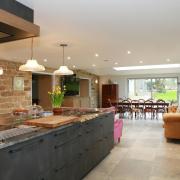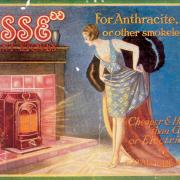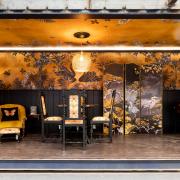Two men quit the world of computers to pursue their dreams of becoming makers of fine furniture. Roger Borrell reports. Photography by Kirsty Thompson

Steven Hampson
Steven Hampson is brutally honest about one of his first major woodworking projects. ‘We bought this house 25 years ago,’ he says. ‘It was a run-down sheep farm but it took us to our financial limit. It was badly in need of restoration but we had to do it ourselves. I built a new kitchen. It was rubbish!’
He quickly adds that he made a much better job of his second kitchen and steady improvement has also been the story of his career as a designer and maker of fine quality furniture.
Steven, who quit a high flying career in the computer industry to set up a workshop in a remote part of Lancashire, is a member of the Society of Designer Craftsmen, exhibits at some of the country’s top shows and has a growing reputation for the quality of his work.
In modern times people consider having their furniture handmade by a craftsmen, unsure of the process and terrified of the cost. ‘People automatically think that because it’s been made for them it’s going to be vastly more expensive. But I’m always up front about prices and there are no hidden extras.’
Attitudes are now changing. ‘There has been a resurgence of interest in artisan makers, the Arts & Crafts ethos of Ruskin and Morris,’ says Steven, sitting in the office of an ancient barn which is now his workshop just outside Chipping.
‘I find clients really enjoy having an association with the person who is making an item for them. They like the process of working with me because it means there is something of them in what I’m making.
‘The fact I am making something special, such as an item their daughter’s wedding, means these are the family heirlooms of the future and that’s a great feeling. Making people happy is the best thing about this job.’
Steven was educated at Ormskirk Grammar School and went from university to work for some top computer companies such as IBM. ‘I spent years driving around the country as a sales director making presentations in front of hundreds of people. I used to average 40,000 miles a year. Now, I cover more miles on my bike than by car.’

The leap from company executive to self-employed furniture maker would be daunting for many. ‘I get more satisfaction from doing this. I need money to live but it’s not the most important thing to me. Having a happy customer is the most amazing thing.’
Steven, who is married to an HR manager and has two sons, one at university and another at Clitheroe Grammar, started with two saws, bought as a job lot for £50. His place of work was a stone and timber barn with an earth floor. For generations it had housed sheep.
He took a year-long course run by furniture makers Acland and Waters at Staveley in the south Lakes and there he learned the basics of the trade before launching his business.
Word got around and he was soon invited to attend one of the country’s most prestigious shows for craftsmen. ‘Work comes mostly by word of mouth, the website or from exhibitions.
‘I exhibit at a big show in Cheltenham and a couple there asked me if I could make them a pedestal games table. It’s walnut, ebony and maple using Computer Aided Design. Part of the brief was that the table had to be big enough for two glasses of wine. I included the glasses in the computer graphic and I think that’s what got me the commission!’ Another outstanding piece he made was an elliptical cabinet with virtually no straight edges.
It took him three months to complete. Much of the wood he uses comes from the Tebay in Westmorland and Newbiggin-on-Lune although the scarcity of timber means that he sometimes has to settle for American walnut. ‘The biggest challenge is getting to right wood. I drove all the way to Scotland to buy sycamore only to discover it wasn’t very good.’
Does working in a barn in the middle of nowhere get lonely? ‘It can but I don’t mind my own company and I’m a keen fell runner and walker so you’ll often find me out on my own.
‘But I do make a point of popping to the pub in Chipping on Fridays. It’s downhill all the way on my bike but the journey home can be a bit more of a challenge.’

John Morris
Craftsman John Morris stands by a pile of wood ready to be turned into impressive items of furniture at his workshop at the Bee Mill in Ribchester. ‘People are always surprised to come in here and discover the pieces of wood I use. They’re used to seeing it covered in shrink wrap in a big DIY store.’
Like Steven Hampson, John came to furniture making later in life after a career testing software for the government.
‘I was interested in woodwork for decades – to call it a hobby probably didn’t do it justice,’ he says. ‘I was more or less self-taught and that makes you feel like a bit of an outsider or a bit of a fraud. But I’ve spent time with other people and that gives you confidence because it makes you realise they are not doing anything different.’
John also shares Steven’s quest for local wood. ‘There are specialist yards that provide it but it depends on what you are looking for. The big furniture maker want consistency. The advantage of working on this scale is that I make one off pieces and can use wood that’s out of the ordinary.’
Recently, he has been making a large media cabinet in solid oak and, on the face of it, a more prosaic a boiler door. ‘It was in a room with Georgian style furniture so I made the door look like a regency barrel-backed niche that opened,’ says John.
‘People are starting to come back to handmade furniture. Often they are people who have been searching for something in particular and come to me when they realise that what they want doesn’t exist and I’ll have to make it.
‘They will be surprised that it’s not that much more expensive that a high quality High Street store. People want something personal that has come about by their collaborations with the maker. If they are prepared to take that leap the prize is something that is truly their own.’



























